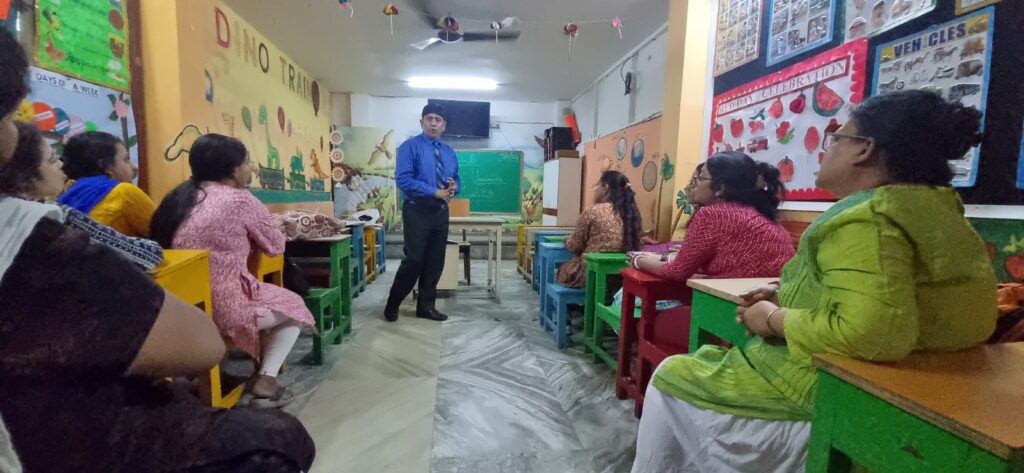Meet Priya, a dedicated teacher with fifteen years of experience. One morning, she noticed a quiet student, Arnab, sketching elaborate designs in his notebook during math class. Her first instinct was to redirect his attention to the lesson. But thanks to her training at RISHI AUROBINDO TEACHERS’ TRAINING INSTITUTE (RATTI), she paused. Instead of seeing a distracted student, she saw an opportunity to understand a unique mind at work.
The Challenge We Face
In today’s educational landscape, teachers encounter classrooms filled with diverse personalities and talents:
Rohit excels in verbal expression but struggles with written work
Meera grasps complex concepts quickly but finds it challenging to work in groups
Zara shows remarkable creativity but needs help with structured tasks
Ahmed demonstrates brilliant problem-solving skills but battles anxiety during exams
Traditional one-size-fits-all teaching approaches often leave such unique needs unaddressed, resulting in:
- Diminished student engagement
- Untapped potential
- Increased classroom management challenges
- Overlooked learning difficulties
- Stress and anxiety among both students and teachers
The RATTI Solution: Embracing Individual Brilliance
At RATTI, we train teachers to transform these challenges into opportunities. Let’s return to Priya’s story. Rather than dismissing Arnab’s sketches, she-
- Observed his natural inclination toward visual learning
- Incorporated geometric patterns into math lessons
- Used his drawings to explain complex mathematical concepts
- Encouraged him to create visual aids for his classmates
The result? Arnab’s grades improved, and his artwork became a valuable teaching tool for the entire class.

Aligning with National Education Policy (NEP)
Our approach at RATTI perfectly aligns with the National Education Policy’s emphasis on:
Skill Development
We train teachers to identify and nurture individual skills
Example: When Sara noticed her student Kiran’s interest in robotics, she integrated basic coding concepts into science lessons
Teachers learn to recognize early vocational inclinations
Case Study: A RATTI-trained teacher helped a mechanically-inclined student channel his interest into a successful school repair club
Value Education
Our comprehensive value education program teaches:
- Emotional Intelligence
- Understanding student emotions (Example: Managing classroom conflicts through empathy exercises)
- Teaching mindfulness and self-awareness
- Caring and Sharing
- Organizing collaborative projects
- Creating buddy systems for peer learning (Example: The “Class Family” initiative where students take turns helping classmates)
- Tolerance and Inclusivity
- Celebrating diversity through cultural exchange programs
- Supporting students with different abilities (Example: The “Everyone’s Voice Matters” program where each student gets dedicated expression time)
Real Stories, Real Impact
Consider Maya’s story: A new teacher frustrated with her diverse classroom of 30 students. After RATTI training, she implemented:
- Morning check-ins to understand each student’s emotional state
- Flexible seating arrangements for different learning styles
- Multiple assessment methods to accommodate various expression styles
- Weekly one-on-one conversations with each student
The results were transformative:
- Classroom harmony improved
- Academic performance increased
- Student attendance rose
- Parent satisfaction grew
- Individual talents flourished
Practical Solutions for Common Challenges
Challenge 1: Different Learning Paces
Solution: Implementation of tiered activities Example: During a history lesson, some students create timelines, others write stories, while some perform historical scenes
Challenge 2: Varied Expression Styles
Solution: Multiple presentation options Example: Students can choose to submit assignments as written reports, oral presentations, or creative projects
Challenge 3: Diverse Emotional Needs
Solution: Emotional check-in system Example: Using mood meters and personal journals to track and address emotional well-being
The Path Forward
At RATTI, we believe every child’s uniqueness is a gift to be unwrapped, not a problem to be solved. Our training programs equip teachers with:
- Observational tools to understand individual learning styles
- Strategies for personalized instruction
- Techniques for emotional support
- Methods for inclusive education
Conclusion: A Vision for Tomorrow
Like Priya discovered with Arnab, understanding each child’s uniqueness isn’t just about better academic outcomes – it’s about nurturing whole individuals who feel valued, understood, and capable of achieving their dreams.
Through our comprehensive training programs that embrace the NEP’s vision, RATTI is committed to creating teachers who don’t just teach subjects, but touch lives. We’re building a future where every child’s unique story contributes to the beautiful narrative of education.

